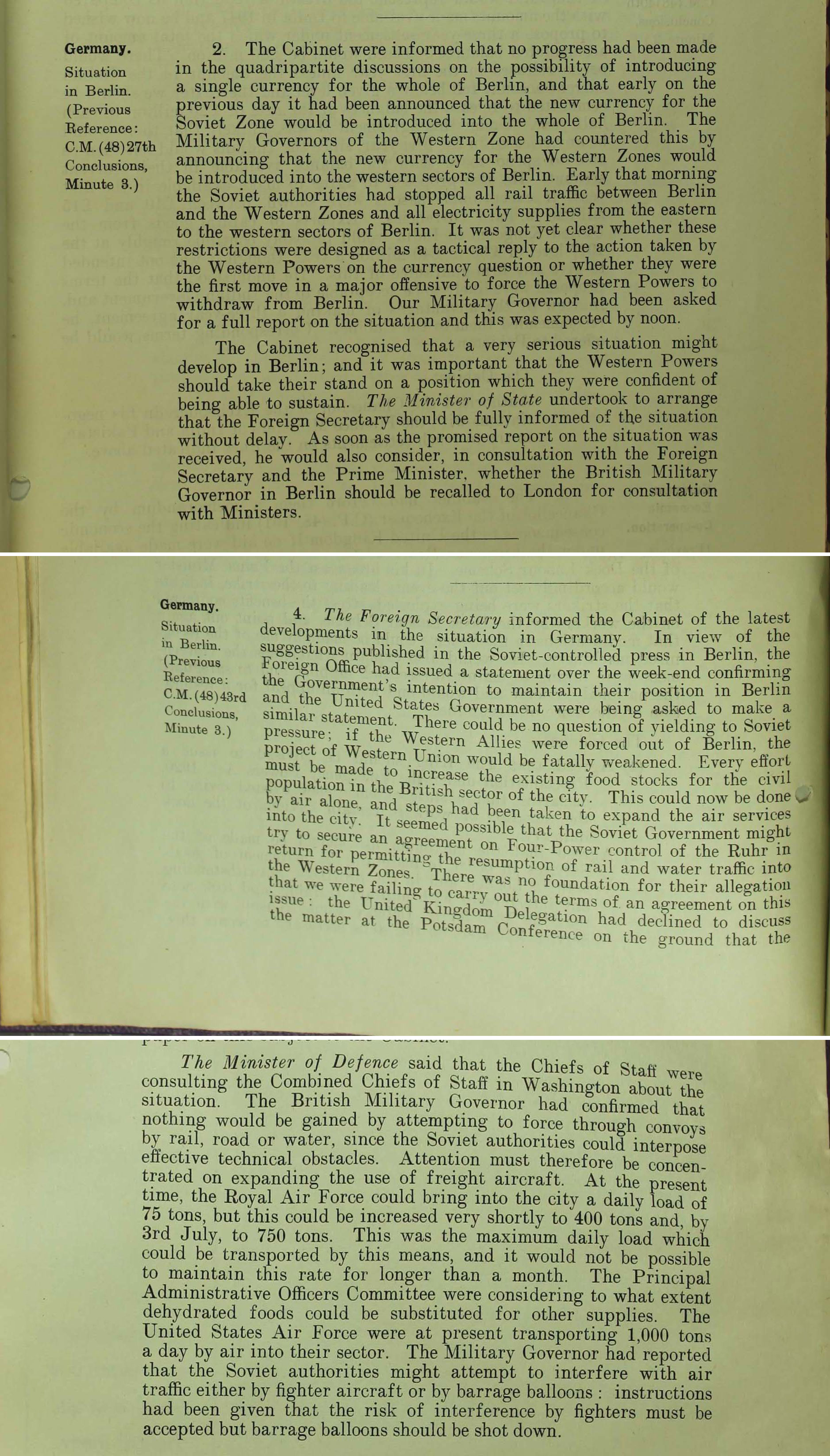
Extract from British Cabinet minutes in 1948 covering discussions over the Berlin Blockade. (Catalogue ref: CAB 128/13)
Transcript
…
The Cabinet were informed that no progress had been made in the quadripartite discussion on the possibility of introducing a single currency for the whole of Berlin, and that early on the previous day it had been announced that the new currency for the Soviet Zone would be introduced into the whole of Berlin. The Military Governors of the Western Zone had countered this by announcing that the new currency for the Western Zones would be introduced into the western sectors of Berlin. Early that morning the Soviet authorities had stopped all rail traffic between Berlin and the Western Zones and all electricity supplied from the eastern to the western sectors of Berlin. It was not yet clear whether these restrictions were designed as a tactical reply to the action taken by the Western powers on the currency question or whether they were the first move in a major offensive to force the Western Powers to withdraw from Berlin. Our Military Governor had been asked for a full report on the situation and this was expected by noon.
The Cabinet recognised that a very serious situation might develop in Berlin; and it was important that the Western Powers should take their stand on a position which they were confident of being able to sustain. The Minister of State undertook to arrange that the Foreign Secretary should be fully informed of the situation without delay. As soon as the promised report on the situation was received, he would also consider, in consultation with the Foreign Secretary and the Prime Minister, whether the British Military Governor in Berlin should be recalled to London for consultation with Ministers.
…
4. The Foreign Secretary informed the Cabinet of the latest developments in the situation in Germany. In view of the suggestions published in the Soviet-controlled press in Berlin, the Foreign Office had issued a statement over the week-end confirming the Government’s intention to maintain their position in Berlin and the United States Government were being asked to make a similar statement. There could be no question of yielding to Soviet pressure; if the Western Allies were forced out of Berlin, the project of Western Union would be fatally weakened. Every effort must be made to increase the existing food stocks for the civil population in the British sector of the city. This could now be done by air alone, and steps had been taken to expand the air services into the city. It seemed possible that the Soviet Government might try to secure an agreement on Four-Power control of the Ruhr in return for permitting the resumption of rail and water traffic into the Western Zones. There was no foundation for their allegation that we were failing to carry out the terms of an agreement on this issue: the United Kingdom Delegation had declined to discuss the matter at the Potsdam Conference
…
The Minister of Defence said that the Chiefs of Staff were consulting the Combined Chiefs of Staff in Washington about the situation. The British Military Governor had confirmed that nothing would be gained by attempting to force through convoys by rail, road or water, since the Soviet authorities could interpose effective technical obstacles. Attention must therefore be concentrated on expanding the use of freight aircraft. At the present time, the Royal Air Force could bring into the city a daily load of 75 tons, but this could be increased very shortly by 400 tons and by, 3rd July, to 750 tons. This was the maximum daily load which could be transported by this means, and it would not be possible to maintain this rate for longer than a month. The Principal Administrative Officers Committee were considering to what extent dehydrated foods could be substituted for other supplies. The United States Air Force were at present transporting 1,000 tons a day by air into their sector. The Military Governor had reported that the Soviet authorities might attempt to interfere with air traffic either by fighter aircraft or by barrage balloons: instructions had been given that the risks of interference by fighters must be accepted but barrage balloons should be shot down.
